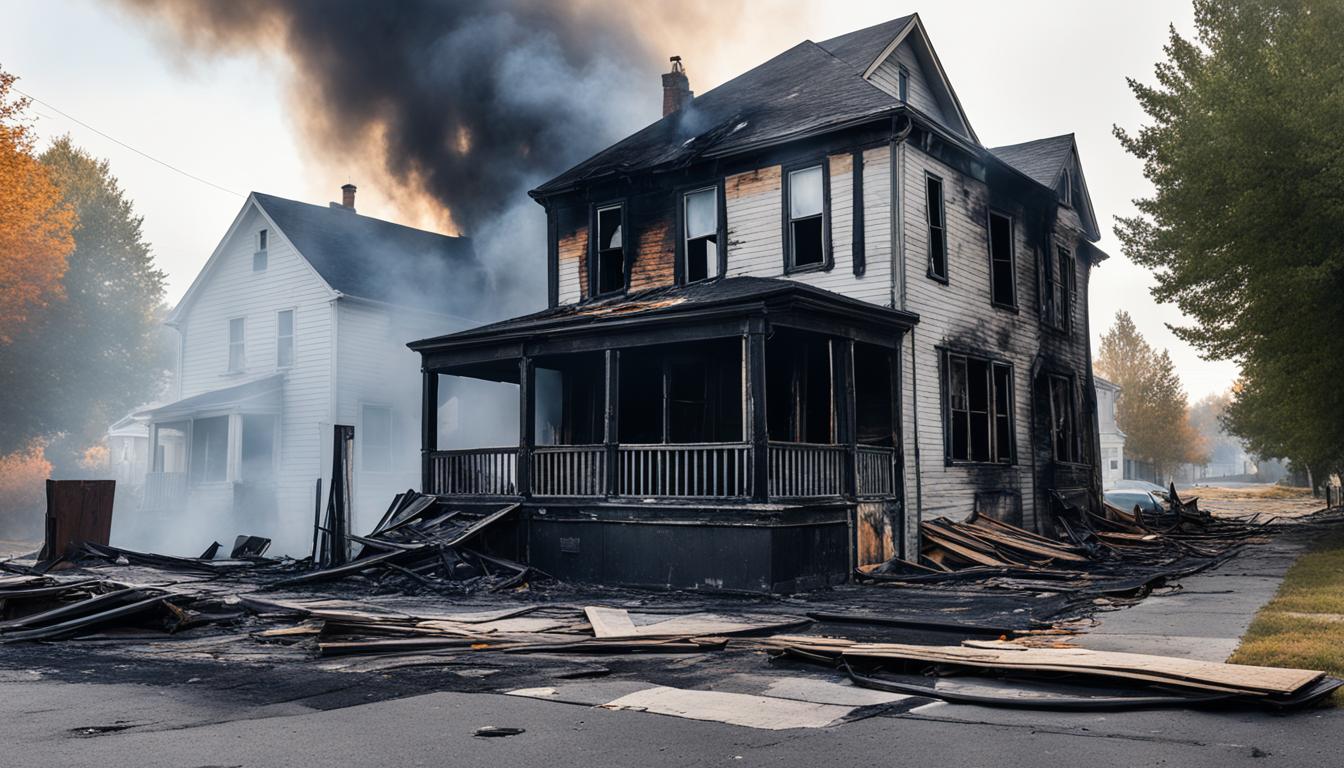Did you know that every year in the United States, there are approximately 1.3 million reported house fires? These devastating incidents can result in significant property damage and pose a threat to the safety of homeowners and their communities. In the aftermath of a house fire, one crucial step that is often taken is boarding up the property. This safety measure plays a vital role in protecting the property, preventing further damage, and ensuring the well-being of those affected.
- Boarding up a house after a fire loss helps prevent theft and looting.
- It allows for proper assessment and cleaning of the property.
- Boarding up limits soot damage and protects valuables that could be restored.
- It serves as a preventive measure against additional damage from vandalism or storms.
- Professional board-up services ensure the property is properly secured.
By understanding the fundamentals of building board up and implementing the necessary protective measures, homeowners can navigate through the aftermath of a fire and take the appropriate steps to restore their property.
Understanding the Fundamentals of Building Board Up
Building board up is a crucial step in the fire restoration process. It involves patching up holes, broken windows, and damaged doors with sturdy materials, such as plywood, to secure the property and protect it from further damage. Additionally, building board up may include the installation of barricades and tarping exposed roofing to create a barrier against outside elements.
Restoration teams, like the highly skilled professionals at Fire and Hail, specialize in providing building board up services. They have the expertise and experience to effectively seal off openings and safeguard the property. By strategically using plywood and other materials, they ensure the property is protected from potential risks.
The restoration team will carefully assess the extent of the fire damage and determine the areas that require immediate attention. They will then proceed with patching up the affected areas, ensuring a secure and stable foundation for the restoration process. By prioritizing building board up, homeowners can prevent further damage and take the necessary steps towards restoring their property.
Why Do They Board Up a House After a Fire?
After a fire loss, boarding up a house is a crucial step in preventing further damage and ensuring the safety of the property. There are several important reasons why homeowners should board up their house after a fire.
First and foremost, boarding up helps prevent looting and unauthorized access to the property. By securing any areas where someone could gain entry, homeowners can minimize the risk of theft and protect their valuable belongings. This is especially important when valuable items, such as electronics, are still present in the house.
Boarding up the house also allows for a proper assessment and cleaning of the property. In commercial buildings, it is common for inventory or stock to still be present after a fire. By boarding up, homeowners can limit foot traffic on the fire scene and prevent soot damage to carpets and upholstery. This ensures that the assessment and cleaning process can be done effectively and efficiently.
Furthermore, boarding up protects valuables that have the potential to be restored. By preventing access to the damaged areas, homeowners can safeguard items that could be salvaged and minimize the risk of further damage. This is particularly important for sentimental or irreplaceable items.
Lastly, boarding up serves as a preventive measure against additional damage. It helps protect the property from vandalism, storms, and other unpredictable events that could worsen the already compromised structure. By boarding up the house, homeowners can mitigate the risk of further damage and ensure the stability of the property.
Protective Measures Against Further Damage
To prevent further damage to a house after a fire, it is essential to take specific protective measures. These measures help secure the property, protect belongings, and minimize the risk of additional problems. One of the most effective ways to achieve this is by hiring professional board-up services.
By boarding up a house after a fire, you can prevent weather-related damage from rain or wind entering the structure. This can significantly reduce the risk of structural issues and further deterioration. Securing the property with boards also helps prevent unauthorized access, ensuring the safety of the belongings that might still be inside.
In addition to weather-related damage, boarding up the property also helps prevent mold growth. After a fire, there may be water or moisture present, which can lead to mold if it enters the structure. By sealing off the property with professional board-up services, you can effectively prevent mold growth and the potential health hazards it poses.
Overall, hiring professional board-up services is crucial to ensure that the property is properly secured and protected from potential risks. These services play a vital role in preventing further damage, protecting belongings, and safeguarding the property against weather-related issues and mold growth.
Navigating Insurance and Legal Concerns Post-Fire
After a fire, homeowners may encounter various insurance and legal concerns that need to be addressed. Promptly contacting the insurance provider and documenting the fire damage thoroughly is essential to ensure a smooth claim process. This includes taking photographs of the affected areas, creating a detailed inventory of damaged items, and organizing all relevant receipts and paperwork.
The claim process requires homeowners to provide evidence and supporting documentation to substantiate the losses incurred due to the fire. By meticulously documenting the damage, homeowners can strengthen their insurance claim and increase the likelihood of receiving proper compensation for their fire damage.
Reviewing the insurance policy and understanding the coverage and limitations is crucial. This ensures homeowners have a clear understanding of what is covered and the potential liabilities they may face. It is advisable to consult with the insurance provider or a professional insurance agent to clarify any questions or concerns regarding the insurance coverage.
In addition to insurance considerations, legal liabilities may arise if the fire has caused damage to neighboring properties or if there are any liability issues involved. In such cases, homeowners should consult with legal professionals who specialize in property damage and fire-related concerns. They can provide guidance on homeowners’ rights and responsibilities and help navigate through any legal complexities that may arise.
By addressing insurance and legal concerns in a timely and proactive manner, homeowners can protect their interests and ensure a smoother recovery process after a fire. Seeking professional advice, keeping thorough documentation, and understanding insurance coverage and legal liabilities are essential steps in effectively navigating the post-fire journey.
Conclusion
Boarding up a house after a fire is an essential step in protecting the property and minimizing further damage. By boarding up, homeowners can ensure the safety of both themselves and the surrounding community. This preventive measure acts as a deterrent against theft while also limiting the spread of soot and smoke damage throughout the property.
In addition to preventing theft, boarding up the house protects valuables that may still have the potential to be restored. By securing the property, homeowners can prevent weather elements from causing additional damage, ensuring that the structure remains intact and minimizing any further deterioration.
Understanding the fundamentals of building board up and taking appropriate protective measures enables homeowners to navigate through the aftermath of a fire and focus on the restoration and rebuilding process. Seeking professional assistance from restoration or construction teams, like Fire and Hail, helps ensure that the property is properly secured and protected.
Furthermore, it is crucial to consider insurance and legal considerations after a fire loss. Promptly contacting the insurance provider, documenting the damage thoroughly, and understanding the coverage and limitations of the insurance policy are all essential steps. Consulting with legal professionals can help homeowners understand any legal liabilities that may arise.
To conclude, by boarding up a house after a fire, homeowners can protect their property, minimize damage, and ensure the safety of themselves and the community. With the right precautions and professional assistance, homeowners can navigate through the challenges of a fire loss and focus on restoring and rebuilding their property.









